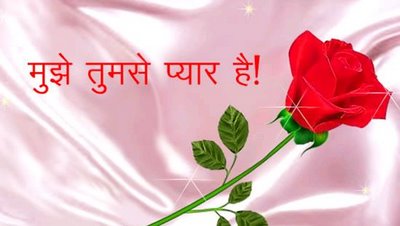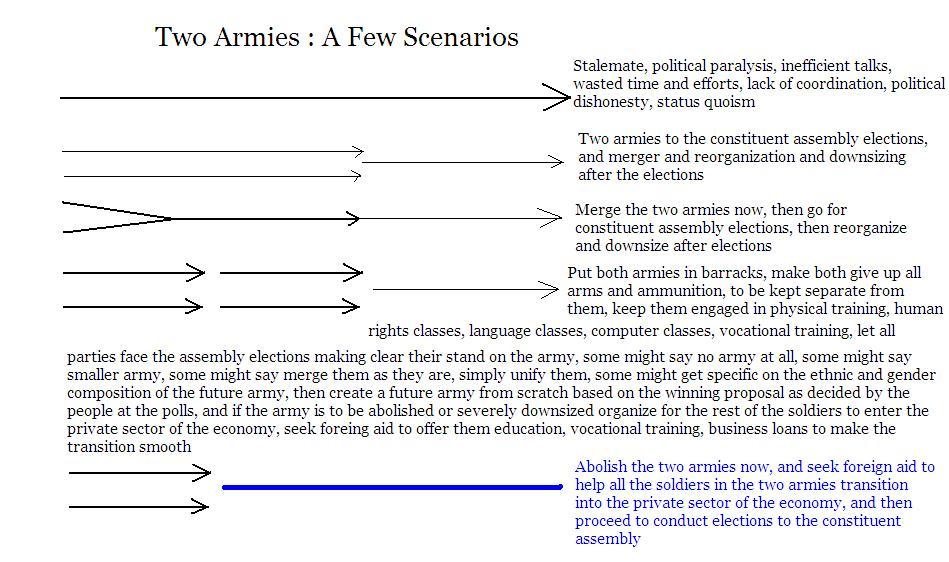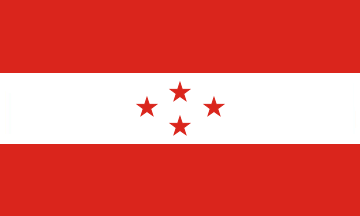
सुझावका अंशहरु-
-हालैको जनक्रान्तिमा नेपाली जनताका भावना र जनादेशबमोजिम लोकतान्त्रिक गणतन्त्रात्मक राज्य निर्माण गरी राज्यको पुनःसंरचना एवं समावेशी मान्यताअनुरूप राज्य व्यवस्था सञ्चालन, सङ्क्रमणकाललाई समग्रतामा मार्गदर्शन र नयाँ संविधानको आधारभूमि तयार गर्ने उद्देश्यले विभिन्न बाह्रवटा सिद्धान्तलाई आधार मानी अन्तरिम संविधान निर्माण गर्नुपर्ने
- नेपालको र्सार्वभौमसत्ता नेपाली जनतामा निहित रहने र त्यसको प्रयोग विधायिकामार्फत् हुनुपर्ने,
- जनक्रान्तिको भावनाबमोजिमको नयाँ राष्ट्रियगान हुनुपर्ने,
- नेपालीलगायत विभिन्न भाषालाई सरकारी कामकाजको भाषा बनाउने व्यवस्था हुनुपर्ने,
-वि.सं.२०३७ को जनमत सङ्ग्रहको मतदाता नामावलीलाई आधार मानी सरल र सहज प्रक्रियाबाट एकपटक नागरिकता प्रदान गरी समस्याको टुङ्गो लगाउने व्यवस्था गर्ने,
-आमाको नामबाट नागरिकता प्राप्त गर्ने व्यवस्था गर्ने
-नेपाल धर्मनिरपेक्ष राज्य हुनुपर्ने।
- संविधानसभा समावेशी मान्यताअनुरूप बनाउन सबैको समानुपातिक प्रतिनिधित्वका लागि समानुपातिक निर्वाचन प्रणाली अपनाउने व्यवस्था गर्ने र मतदाताको उमेर १६ वर्ष गर्ने।
- जनआन्दोलनको मुख्य जनादेश लोकतान्त्रिक गणतन्त्र स्थापना भएकाले सोसम्बन्धमा जनताको मत सङ्कलन गरी संविधानसभाले सोहीअनुरूपको संविधान निर्माण गर्न जनमत सङ्ग्रह र संविधानसभाको निर्वाचन एकैपटक गर्ने।
-मुलुकको महत्वपूर्ण विषयमा निर्णय गर्न जनमतसङ्ग्रहको व्यवस्था समावेश गर्नुपर्दछ।
- हाल बहाल रहेको प्रतिनिधिसभालाई प्रतिस्थापन गर्ने अर्को व्यवस्था नभएसम्म यसै प्रतिनिधिसभाले व्यवस्थापिकाको सम्पूर्ण कार्य गर्ने र सात राजनीतिक दल एवं नेकपा माओवादीबीच भएको सहमतिअनुरूप प्रतिनिधिसभाको विकल्पमा बन्ने वैकल्पिक व्यवस्थाले त्यस उप्रान्त व्यवस्थापिकाको कार्य गर्ने।
-मानवअधिकारका अन्तर्राष्ट्रिय मान्यता र प्रचलनअनुरूप विद्यमान मौलिक हकको व्यवस्थामा थप गरी जीवन, स्वास्थ्य, शिक्षा, सुरक्षा, क्षतिपूर्ति, पीडितको पुनःस्थापना र क्षतिपूर्ति, अल्पसङ्ख्यक, आदिवासी, अपाङ्ग, बालबालिका, बौद्धिक सम्पति, रोजगारी र पैतृक सम्पतिमा छोराछोरीको समानअधिकार तथा खाद्य संप्रभुताको प्रत्याभूतिजस्ता विभिन्न हकअधिकारलाई जनताको अधिकारका रूपमा समावेश गर्ने ।
-राज्यका निर्देशक सिद्धान्तमा राज्यका विभिन्न तहमा महिलाको एक तिहाई प्रतिनिधित्व गरिने नीति स्पष्ट गर्ने, मुलुकलाई सबै प्रकारका भेदभावको अन्त्य र हिंसामुक्त बनाउने, दलित, जनजाति, आदिवासी, मधेशी, अपाङ्ग, श्रमिक, किसान, पिछडिएका क्षेत्र र गरिबीको रेखामुनि रहेका जनताको विकासका निम्ति विशेष कार्यक्रम सञ्चालन गर्ने, राष्ट्रसङ्घको बडापत्र र पञ्चशीलका सिद्धान्तका आधारमा राष्ट्रिय हितअनुरूपको परराष्ट्र नीति अबलम्बन गर्ने।
-राज्यको आर्थिक नीतिमा सामन्ती व्यवस्थाको पूर्ण रूपमा अन्त्य गर्ने, क्रान्तिकारी भूमिसुधारलाई कार्यान्वयन गर्ने तथा आर्थिक क्षेत्रमा राजकीय, सहकारी र निजी क्षेत्रको भूमिकालाई सन्तुलितरूपमा सञ्चालन गरी धनी र गरिबको असमानतालाई न्यूनीकरण गर्ने।
-कार्यपालिकाको सम्पूर्ण अधिकार मन्त्रिपरिषदमा रहने, सङ्क्रणकालमा बन्ने मन्त्रिपरिषद र्सवदलीय हुने हुँदा त्यसले सहमतिका आधारमा आफ्नो कार्यसम्पादन गर्ने र शासनप्रशासन र्सवदलीय सहमतिका आधारमा तय गरिएको विधि र प्रक्रियाअनुरूप सञ्चालन हुनुपर्ने।
-संविधान तथा संविधानसभाको निर्वाचनसम्बन्धमा उठेका विवादलाई टुङ्गो लगाउन संवैधानिक अदालतको व्यवस्था गर्ने, संविधानसभा, जनमत सङ्ग्रह र स्थानीय निकायको निर्वाचनका लागि स्वतन्त्र र निष्पक्ष आयोगको गठन गर्ने र राष्ट्रिय मानवअधिकार आयोगलाई संवैधानिक अङ्गका रूपमा समावेश गर्ने।
-नेपाली सेनाको सङ्गठनलाई समावेशी र राष्ट्रिय स्वरूपको बनाउने, सेनाको लोकतान्त्रीकरण र आधुनिकीकरण गर्दै त्यसलाई दक्ष र व्यावसायिक बनाउने, सेना व्यवस्थापिकाप्रति उत्तरदायी हुने तथा नेपाली सेनाको नियन्त्रण, प्रयोग र परिचालन गर्न मन्त्रिपरिषदले राष्ट्रिय सुरक्षा परिषद गठन गर्ने।
अन्तरिम संविधान जारी भएपछि नेपाल अधिराज्यको संविधान, २०४७ खारेज गर्नुपर्ने। सो संविधान कार्यान्वयन गर्न कुनै बाधा-अड्काऊ परेमा मन्त्रिपरिषद्को प्रस्तावका आधारमा प्रतिनिधिसभा वा व्यवस्थापिकाले त्यस्तो बाधाअड्काऊ फुकाउनसक्ने व्यवस्था गर्ने।The UML document comes across as a middle ground between the Maoist and Congress documents especially on the arms management issue.
I appreciate the clear commitment to a democratic republic. At this rate you are looking at a UML-Maoist coalition government at the center.
Using languages other than Nepali in government work is a big jump from where this party was in 1990, but the stand is still too vague. The technical details and implications have to be thought out.
I greatly appreciate the positive word on the citizenship paper issue. Since all the big parties are for it now, I expect this issue to be resolved before the constituent assembly elections.
Bringing the voting age down to 16 makes a lot of sense for a young population like Nepal.
The UML also holds the middle ground on the interim parliament idea. It appears to be more flexible than either the Maoists or the Koirala Congress.
1/3 reservations for women at all levels of government is one of the best things to have come out of the April Revolution.
Land reform: this has to be done. Likely a UML-Maoist coalition government will do it.
Government ownership, co-operative style of ownership, and private ownership. The UML says all three will come into play. This also is a middle ground between the Maoists and the Congress.
The army will not be dismantled. None of the parties have entertained that idea. The parties need to get more specific on what they mean by democratization of the army.
What about the size? Right now you are looking at an army that is 130,000 strong. That is too big. How will the downsizing happen?
Paying For Democracy
Hindi Is At The Core Of The Madhesi Identity
The UML Can Break The Deadlock
Critiquing The Nepali Congress Proposed Constitution
नेपाली कांग्रेसको संविधान मस्यौदा
April Convention: Creating A Glowing Core
Critiquing The Maoist Proposed Constitution
माओवादीको संविधान मस्यौदा
Critiquing Pitambar Sharma's Federalism
Baburam Bhattarai, Janadesh Article
What Is The SPA Report On The Maoists?
Fire Some Generals
Visitors
Page views yesterday 206
| 12:11 | Planet Internet, Netherlands, The |
| 13. | 12:31 | TV Cable, Colombia | |
| 14. | 12:32 | Videsh Sanchar Nigam Ltd, India | |
| 15. | 12:34 | Swipnet, Sweden |
| 12:36 | Cisco Systems, Inc., United States |
| 12:42 | Infocom Pvt. Ltd., Nepal |
| 13:21 | University Nebraska Medical, Omaha, United States |
| 32. | 13:55 | Videsh Sanchar Nigam Ltd, India | |
| 33. | 13:59 | Duke University, Durham, United States | |
| 34. | 14:07 | Xspedius Management Co.,LLC., United States | |
| 35. | 14:11 | Duke University, Durham, United States | |
| 36. | 14:13 | Sapient Italy, United States |
| 39. | 14:27 | AMD, Austin, United States | |
| 40. | 14:30 | AMD, Austin, United States |
| 42. | 14:46 | Ameritech, United States | |
| 43. | 14:49 | Ameritech, United States | |
| 44. | 14:50 | Fannie Mae, Washington, D.C., United States | |
| 45. | 14:51 | Fannie Mae, Washington, D.C., United States |
| 49. | 14:57 | Equant, France | |
| 50. | 15:01 | Cornell University, Ithaca, United States |





